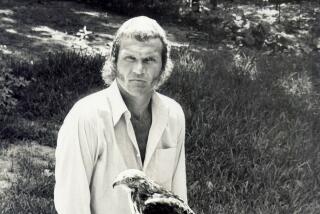You Shouldn’t Go Home Again : GONE THE SUN <i> by Winston Groom (Doubleday: $18.95; 312 pp.) </i>
- Share via
In 1925, Sherwood Anderson advised William Faulkner to write about “that little patch up there in Mississippi where you started from.” Faulkner went home to Oxford, Miss., and created Yoknapatawpha County, whose characters lived out the tragic end of the Old South. The series of novels that Faulkner wrote won him the 1949 Nobel prize.
It also forced a ritual upon all Southern novelists who came after him: They have to take their first Faulknerian, two-page, steamy, Gothic, perambulating sentences and, despite the fact that they sound great (especially after a quart of whiskey), toss them into the fireplace and start over.
This new novel, “Gone the Sun,” is by a Southern writer who has taken Anderson’s advice and also survived the fireplace.
Winston Groom has written four novels, and he can be at his best when he writes about the little patch he started from, Mobile, Ala. And there is hardly a hint of Faulkner in his work. It is crisp and modern--the prose of the New South. This is the South that Walker Percy has also captured, the one with the Rolex watches and the Mercedes Benzes and the huge middle class that just moved in yesterday from New Jersey or someplace and doesn’t know Sherman from Traveler.
In “Gone the Sun,” Groom has returned to Bienville, a Gulf Coast city that is unmistakably Mobile. Bienville was also the setting of an earlier Groom novel, “As Summer Dies,” one of the best pieces of fiction about the 1950s Deep South that I have ever read.
Beau Gunn, the main character in the new book, was born to a good family and spent his youth in the local military school, where character building consists of cruel hazing and the glorification of narrowness. But something delightfully good and fair survived in Beau, and not even a nightmarish tour in Vietnam could stifle it.
He becomes a top journalist and a successful playwright. He realizes that women are his equals and he learns to love.
But when we meet Beau, he is hitting middle age and starting to lose his grip. His new play, about Vietnam, is turning off his New York backers because he can’t work through a scene in which a Viet Cong soldier is executed by a young American officer. And Beau’s girlfriend, Sheilah, is beginning to suffocate him with her crass climb to the top of the broadcast news world.
So Beau does what many Southerners do in this kind of situation. He gets sentimental. He remembers thick nights when the katydids sing you to sleep, and lazy days when a fishing cabin back in the swamp is a refuge for the heart and the mind.
Beau decides to go home.
But Bienville has changed, as his friend, Pappy, who has just bought the newspaper, explains. Although the old families still dominate, the ethics of multinational corporations are starting to hold sway. There has been a murder outside a bar, and the victim was connected to one of those companies. The chief suspect is an old friend of Beau’s and Pappy’s, a hapless drunk who did something horrible--but accidental--when they were boys that changed them all forever.
Pappy thinks the solution to the murder will not only clear their friend but expose the whole smelly transition that Bienville has been making to the New South. Beau becomes editor of the newspaper and starts to solve the murder.
But even in the New South, blood is thick. And for Beau, this is to have tragic consequences.
Before I lower the boom on this book, I would like to say that it does confirm my opinion that Groom is one of the best writers of dialogue today. That and his story-telling ability keep you going in “Gone the Sun” even as the book fails.
It fails because Groom walks away from the chance to explore the disturbing transformation of the South, and from the chance to more deeply explore Beau Gunn as tormented Southerner come home. What we get instead reads at times like a knockoff of Travis McGee.
And there are other problems. The character of Sheilah is so poorly developed that you never understand why she is supposed to be such a demonic force in Beau’s life. Early in the book, there is the kind of factual error that gets us off on the wrong foot: Beau catches a trout near his cabin outside Bienville. The trout, however, is a cold-water fish that cannot survive anywhere near the Gulf Coast. Later he shoots a “black mallard” for dinner. Sorry, Winston, there ain’t no such duck.
Near the end of the book, there is a confusion of dates in the chronology that, at first, appears to make the plot jump backward.
But the most jarring flaw is Pappy as a first-person narrator. Somehow he knows everything Beau does, even in Beau’s most private moments. Never is it explained that Beau told all of this to Pappy at some point. But while that might have helped, it still would not have been convincing. Why didn’t an editor simply suggest the omniscient third person?
I have read and enjoyed Groom’s four other books, but as I put down “Gone the Sun” I ached for him. It is not the big book Groom fans have been waiting for.
More to Read
Sign up for our Book Club newsletter
Get the latest news, events and more from the Los Angeles Times Book Club, and help us get L.A. reading and talking.
You may occasionally receive promotional content from the Los Angeles Times.





